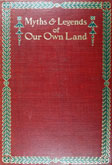The Rival Fiddlers
United States folktale
Before Brooklyn had spread itself beyond Greenwood Cemetery a stone could be seen in Martense's Lane, south of that burial-ground, that bore a hoof mark. A negro named Joost, in the service of the Van Der Something-or-others, was plodding home on Saturday night, his fiddle under his arm. He had been playing for a wedding in Flatbush and had been drinking schnapps until he saw stars on the ground and fences in the sky; in fact, the universe seemed so out of order that he seated himself rather heavily on this rock to think about it. The behavior of the stars in swimming and rolling struck him as especially curious, and he conceived the notion that they wanted to dance. Putting his fiddle to his chin, he began a wild jig, and though he made it up as he went along, he was conscious of doing finely, when the boom of a bell sent a shiver down his spine. It was twelve o'clock, and here he was playing a dance tune on Sunday. However, the sin of playing for one second on the Sabbath was as great as that of playing all day; so, as long as he was in for it, he resolved to carry the tune to the end, and he fiddled away with a reckless vehemence. Presently he became aware that the music was both wilder and sweeter than before, and that there was more of it. Not until then did he observe that a tall, thin stranger stood beside him; and that he was fiddling too,—composing a second to Joost's air, as if he could read his thought before he put it into execution on the strings. Joost paused, and the stranger did likewise.
"Where de debble did you come frum?" asked the first. The other smiled.
"And how did you come to know dat music?" Joost pursued.
"Oh, I've known that tune for years," was the reply. "It's called 'The
Devil's joy at Sabbath Breaking.'"
"You're a liar!" cried the negro. The stranger bowed and burst into a roar of laughter. "A liar!" repeated Joost,—"for I made up dat music dis very minute."
"Yet you notice that I could follow when you played."
"Humph! Yes, you can follow."
"And I can lead, too. Do you know the tune 'Go to the Devil and Shake
Yourself?'"
"Yes; but I play second to nobody."
"Very well, I'll beat you at any air you try."
"Done!" said Joost. And then began a contest that lasted until daybreak.
The stranger was an expert, but Joost seemed to be inspired, and just as
the sun appeared he sounded, in broad and solemn harmonies, the hymn of
Von Catts:
"Now behold, at dawn of day, Pious Dutchmen sing and pray."
At that the stranger exclaimed, "Well, that beats the devil!" and striking his foot angrily on the rock, disappeared in a flash of fire like a burst bomb. Joost was hurled twenty feet by the explosion, and lay on the ground insensible until a herdsman found him some hours later. As he suffered no harm from the contest and became a better fiddler than ever, it is supposed that the recording angel did not inscribe his feat of Sabbath breaking against him in large letters. There were a few who doubted his story, but they had nothing more to say when he showed them the hoof-mark on the rock. Moreover, there are fewer fiddlers among the negroes than there used to be, because they say that the violin is the devil's instrument.
Myths And Legends Of Our Own Land
Vol. II The isle of Manhattoes and nearby

Notes:Contains 15 US folktales
Author: Charles M. Skinner
Published: 1896
Publisher: J.P. Lippincott Company, Philadelphia and London